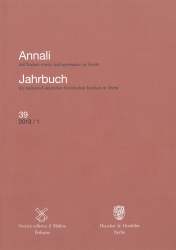Annali dell'Istituto storico italo-germanico in Trento | Jahrbuch des italienisch-deutschen historischen Instituts in Trient, 39, 2013/1

Editore: il Mulino - Duncker&Humblot
Città: Bologna
Anno: 2013
Pagine: 187
Cartaceo
Indice
Editoriale | pp. 7
- Christof Dipper - Annali ISIG – I primi 35 anni visti dalla prospettiva tedesca
pp. 9-59
Saggi
- Peter Vogt - «Virtù vince fortuna». Ascesa, cambiamento e tarda fioritura di un topos dell’età moderna
pp. 63-103 - Kerstin von Lingen - Il trauma culturale di Caporetto: il luogo della sconfitta nella memoria patriottica dell’Italia
pp. 105-139
Recensioni
- Angela De Benedictis, Gustavo Corni, Brigitte Mazohl, Daniela Rando, Luise Schorn-Schütte - Das Politische als Argument. Beiträge zur Forschungsdebatte aus dem Internationalen Graduiertenkolleg «Politische Kommunikation von der Antike bis in das 20. Jahrhundert» (P. Becker)
pp. 143-146 - Christoph Dartmann - Politische Interaktion in der italienischen Stadtkommune (11.-14. Jahrhundert) (M. Veronesi)
pp. 146-148 - Dorothea Weltecke - «Der Narr spricht: Es ist kein Gott». Atheismus, Unglauben und Glaubenszweifel vom 12. Jahrhundert bis zur Neuzeit (S. Steinberg)
pp. 149-151 - Marjorie Elizabeth Plummer - From Priest’s Whore to Pastor’s Wife. Clerical Marriage and the Process of Reform in the Early German Reformation (F. Alfieri)
pp. 151-154 - Volker Reinhardt - Im Schatten von Sankt Peter. Die Geschichte des barocken Rom (I. Fosi)
pp. 154-157 - Markus A. Denzel, Jan de Vries, Philipp Robinson Rössner - Small is Beautiful? Interlopers and Smaller Trading Nations in the Pre-Industrial Period (K. Occhi)
pp. 157-160 - Paul Shore - Narratives of Adversity. Jesuits on the Eastern Peripheries of the Habsburg Realms (1640-1773) (E. Mezzoli)
pp. 160-163 - Werner Daum con la collaborazione di Peter Brandt, Martin Kirsch, Arthur Schlegelmilch - Handbuch der europäischen Verfassungsgeschichte im 19. Jahrhundert. Institutionen und Rechtspraxis im gesellschaftlichen Wandel, II: 1815-1847 (M. Bellabarba)
pp. 163-166 - Robert Gerwarth, John Horne - War in Peace. Paramilitary Violence in Europe after the Great War (M. Mondini)
pp. 167-170 - Klaus Heitmann - Das italienische Deutschlandbild in seiner Geschichte, III/1: Das kurze zwanzigste Jahrhundert (1914-1989). Italien gegen Deutschland: der Erste Weltkrieg (G. D’Ottavio)
pp. 170-172 - Michael Henkel - Hermann Hellers Theorie der Politik und des Staates. Die Geburt der Politikwissenschaft aus dem Geiste der Soziologie / Marcus Llanque (ed), Souveräne Demokratie und soziale Homogenität. Das politische Denken Hermann Hellers (M. Cau)
pp. 173-175 - Sven Jüngerkes - Diplomaten der Wirtschaft. Die Geschichte des Ost-Ausschusses der Deutschen Wirtschaft (G. Bernardini)
pp. 176-178
Bollettino
- Attività convegnistica | pp. 181
- Attività editoriale | pp. 186
- Biblioteca | pp. 187
Autori | pp. 189
Download n. 39, 1, 2013
Abstract
Peter Vogt - «Virtù vince fortuna». Ascesa, cambiamento e tarda fioritura di un topos dell’età moderna
The principal aim of this paper is to systematically organize the manifold attempts at articulating the relationship between the concept and idea of fortuna and the human capacity for virtù from Roman antiquity up to the 17th century. I do not and cannot reasonably presume to give an exhaustive account of the abundant historical material regarding this relationship. No single person could. Only a cooperation of various specialists from several disciplines would be able to accomplish such a task. My interest is rather to systematically draw some conclusions from the specifi c historical material selected for my paper. One must distinguish three different ways in which the relationship between «fortune» and «virtue» has historically been understood: a) The first position, originally formulated in antiquity, claims that human conduct can actively control fortuna, either by directly infl uencing it or by dodging its attacks. b) A second position originally stems from Boethius. Here, the existence of fortune is not denied, as in St. Augustine’s theology. Fortune is rather seen as a means of providence. The proper human reaction is thus not to try to act upon fortune, but rather to accept the decision of what is principally beyond human control. c) According to a third position, which becomes infl uential in the late Renaissance and after the decline of the Italian city-republics, any attempt at reconciling fortune and providence is no longer reasonable. Fortune, according to this third position, acts autonomously. This presupposition, however, does not give rise to the optimism of the fi rst position, but generates a universal feeling of defenselessness in the human actors of the theatrum mundi.
Kerstin von Lingen - Il trauma culturale di Caporetto: il luogo della sconfitta nella memoria patriottica dell’Italia
This paper argues that Italian memory politics in the 20 century are united by the trauma of defeat regarding the memory of both wars. Via a cultural-historical approach, it argues that the transformation of war victims in a narrative of sacrifice for the sake of reconstructing a new nation born of war is one of the constituting elements of Italian national memory politics in the 20th century. It therefore contests Insneghi’s theory of Italy’s «necessary tragedy». By analyzing the aftermath of the battle of Caporetto and the memory campaigns of different Italian governments, the heroic architecture of the Fascist Era, as well as cinematic and literary sources dealing with the Great War in the Alps, a direct link is established to the memory politics regarding the sacrifi ces of the Resistenza. Only after the successful efforts at nation building in 1945, the trauma of defeat at the Isonzo River rose to public interest and, liberated of its heroic ballast, was fi nally discussed. In this regard, the Allied rejection of Italian geopolitical interests after 1919 can be seen as an «echo», which carved the memory of defeat into the Italian consciousness; it could only be deleted after 1945 by a new, victorious war narrative – the Resistenza narrative.

